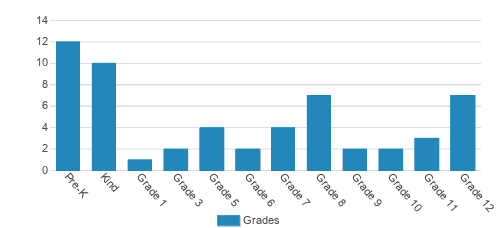Calvary Christian Academy (CCA) is a college preparatory school that offers instruction for students in kindergarten through twelfth grade.
Classroom teaching at Calvary integrates California State Content Standards in accelerated units of cross-curricular, project-based study which encourage depth and complexity of thought.
Mathematics, writer's workshops, literature, social studies and science are all integral to the student's academic experience.
The school also offers art, theatre, music and Spanish to its students.
School Overview
Student Body
Total Students
56 students
Student Body Type
Co-ed
% Students of Color
89%
State avg.: 51%
Students by Grade

Academics and Faculty
Total Classroom Teachers
4 teachers
Student : Teacher Ratio
14:1
National avg.: 13:1
Average Class Size
10 students
Number of AP Courses
2 courses
Tuition and Acceptance Rate
Admission Deadline
None / Rolling
Tuition Notes
Contact school
% on Financial Aid
8%
Admissions Director
Tracy Herrera
Sports
Total Sports Offered
4 sports
Sports
School Notes
- Calvary Christian Academy seeks to develop students who possess qualities that will enable them to live as productive members of society. Committed Christians Who: ' Understand the meaning of Salvation and have been given the opportunity to follow Jesus Christ as their Savior. ' Employ the Bible as the life guidebook ' Make strong ethical choices based upon the Bible. ' Genuinely love humankind, with an appreciation for the diversity of cultures and a tolerance of individual differences ' Demonstrate skills in resolving conflict through positive, biblical methods. Effective Communicators Who: ' Convey significant messages ' Receive, interpret and use the messages of others ' Listen objectively to other points of view and seek conflict resolution. Critical Thinkers Who: ' Identify, locate and organize information or data ' Analyze, evaluate, and synthesize information through independent and/or cooperative efforts in order to reach resolution. ' Apply problem-solving strategies to real-life scenarios. Quality Producers Who: ' Complete tasks in a responsible, timely fashion ' Display growing knowledge of curriculum. ' Develop God-given talents and abilities ' Set, pursue, and accomplish realistic, challenging goals, and demonstrate standards of excellence. Community Participants Who: ' Have a heart of service towards the people of this nation and the world, contributing of their time and talents. ' Act in an ethical and responsible manner. ' Display a greater appreciation for the historical background and diverse origins of people and events.
Source: National Center for Education Statistics (NCES)
Frequently Asked Questions
What sports does Calvary Christian Academy offer?
Calvary Christian Academy offers 4 interscholastic sports: Baseball, Basketball, Softball and Volleyball.
When is the application deadline for Calvary Christian Academy?
The application deadline for Calvary Christian Academy is rolling (applications are reviewed as they are received year-round).
Recent Articles

A Parent's Guide To Understanding High School Teaching Methods
This comprehensive guide helps parents navigate the various teaching methods used in today's high school classrooms. By understanding these approaches, you'll be better equipped to support your teen's learning journey, communicate effectively with teachers, and create a complementary learning environment at home.

February 08, 2025
Social Emotional Learning: Education's Hidden SymphonyA musician's perspective on Social Emotional Learning reveals how this educational framework orchestrates success through five essential emotional competencies.

January 24, 2025
A Roadmap For Starting A Private SchoolUse this roadmap as a set of talking points with your trusted mentors and professionals to start the private school of your dreams. You're not alone. Over the years, hundreds of folks like you have had the same dream. From Quintilian to Maria Montessori to Lucy Madeira Wing, visionary educators have established schools to teach according to their beliefs and methodologies.

















